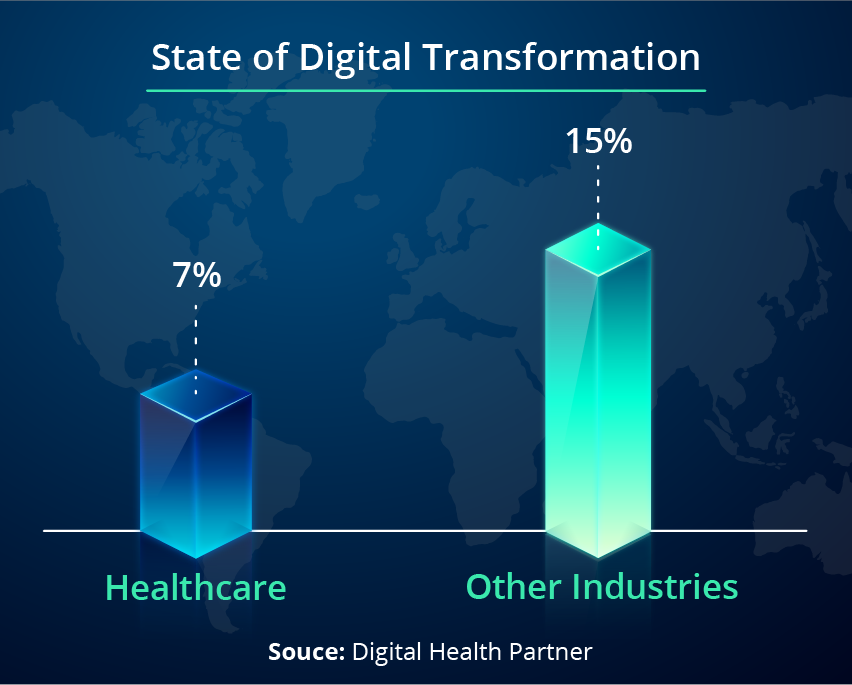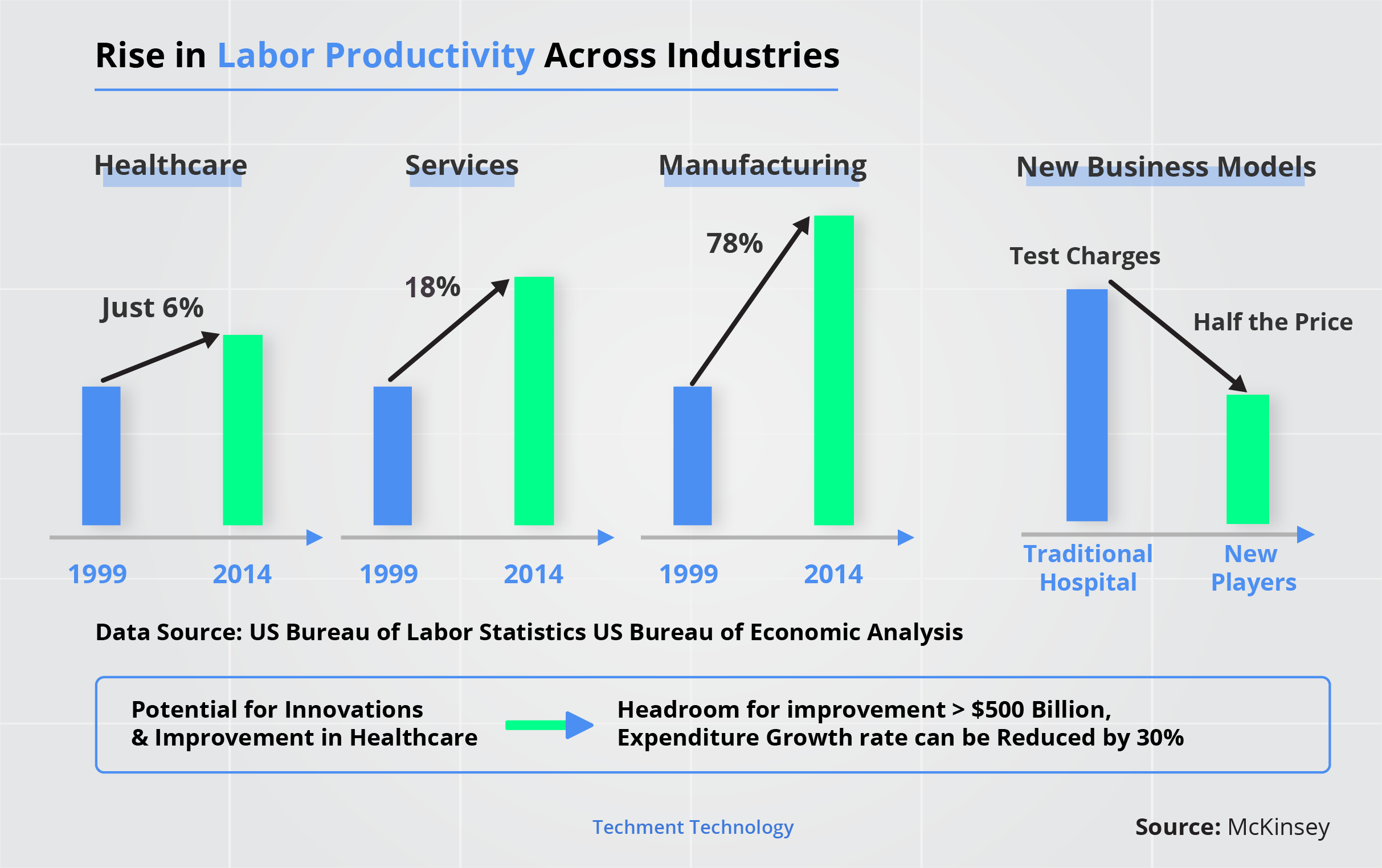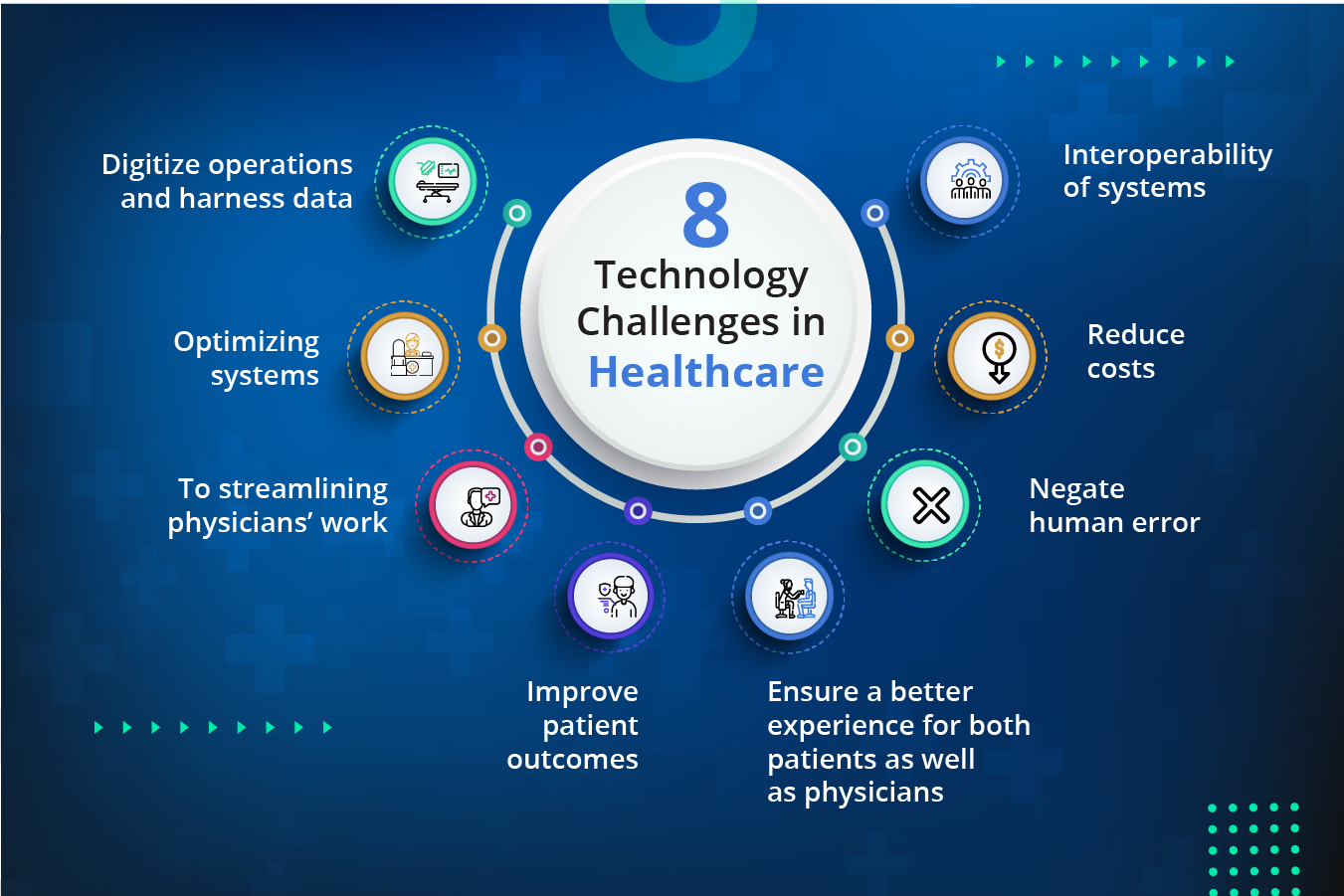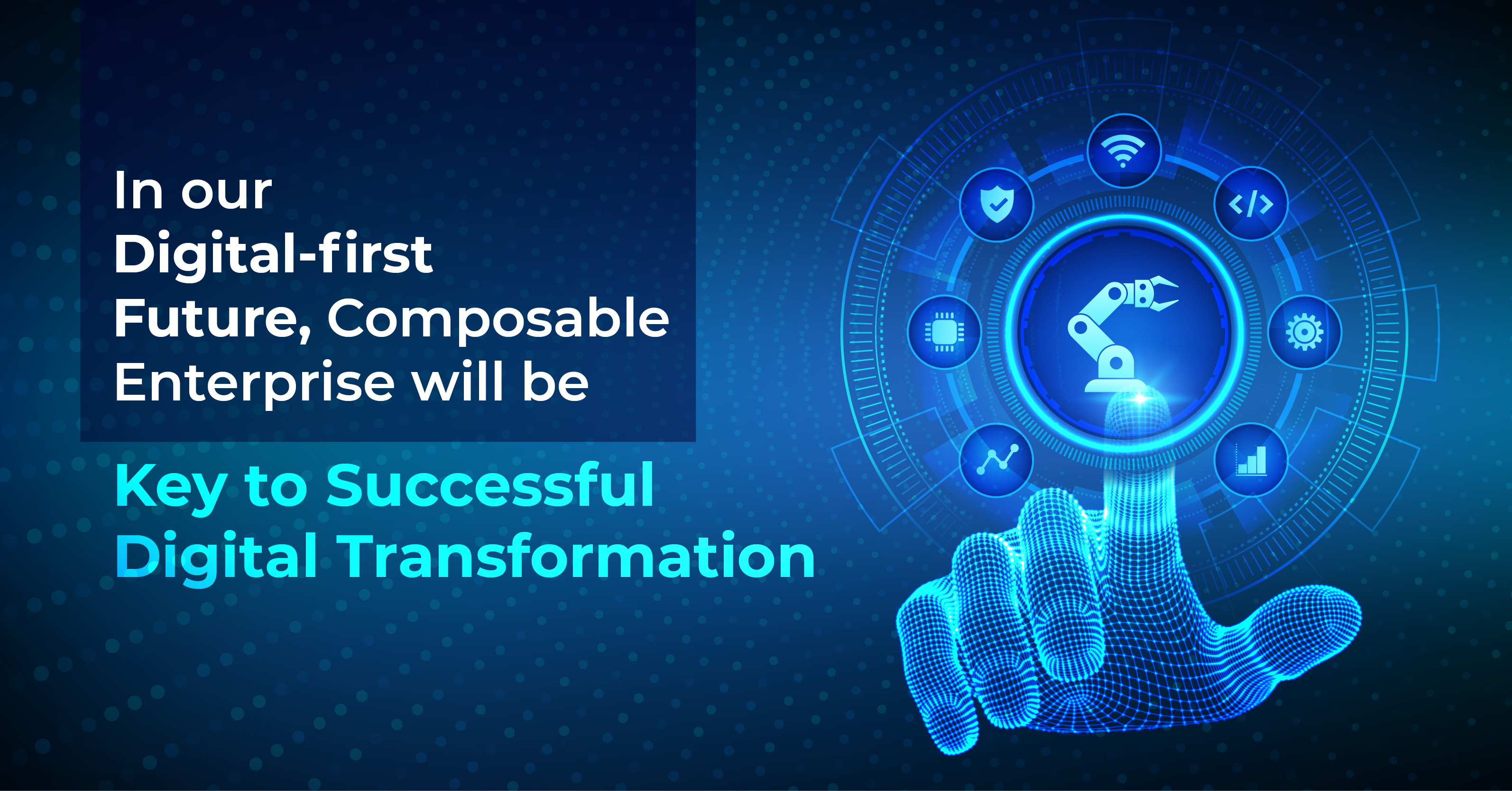The hyperbole surrounding Digital Transformation has a ring of truth that comes from the incredible results it has demonstrated in every industry.
Yet it has taken a while for the healthcare industry to wake up to digital as a matter of great immediacy. The delay could be attributed to the radically different nature of healthcare owing to its highly regulatory and conservative approach that remains highly skeptical of digital technologies on issues such as cybersecurity and privacy.
According to recent research by Digital Health Partners, only 7% of healthcare and pharmaceutical companies have gone digital, vis-a-vis 15% in other industries. The latest research by McKinsey (Telehealth: A quarter-trillion dollar post-COVID-19 reality?) slates the potential for value creation to be near USD 250 billion. This makes the visualization of the amount of value that can be created via digitals technologies abundantly clear.

Going digital has become an existential necessity because of the need and impact of technologies like integrative Platforms, Telemedicine, AI-enabled IoMT, Blockchain, and more, have shown incredible results for frontier organizations.
Challenges That Lie at the Heart of Present Healthcare Systems
Research in the area of productivity finds the healthcare industry to lag behind other industries by a significant margin.

Below are some significant issues picked from the laundry list.
At the roundtable we tried to address these issues with a discussion where prominent industry experts spoke on core issues surrounding digital transformation in healthcare.
The Healthcare Roundtable
In response to the unprecedented digital acceleration in Healthcare, Techment organized this roundtable with prominent global healthcare experts and over 150 participants who joined us from 13 countries.
Manish Agrawal, co-founder and CEO, Techment Technology, was the perfect host of the event. He coordinated the entire session, asked tough questions to the panelists, conducted polls and monitored the Q&A sessions.

Here are the excerpts from the roundtable discussion:
The Dawn of Consumer-Centric Healthcare
“How has the pandemic changed patient needs and expectations, and what care providers must do to better serve the evolved patient? And do you feel it right if we call them customers?”
Dr. Vikram Venkateswaran responded to the questions directed at him:
“Today, the consumer expectation has undergone a radical change, and the benchmark of services is Amazon. Consumers expect the same level of service from healthcare providers. Globally, private caregivers who do not adapt to digital, do not harness data, and fail to use it for insights will perish in the coming 5-10 years. The gap between patient expectations and what care providers can deliver will prove fatal.” Dr. Vikram concluded.
Leveraging Data for Better Care Delivery
“How can care providers leverage data to address issues of value-based care, personalization, and interoperability?’
James J. Stoodt responded to the question:
“Digital is transforming two core entities of the care system: The patient and the care team. Data allows strategic decision-making for both parties and thus, facilitates better patient care and personalization of care with telehealth in the grand scheme of things.” James explained.
Digital Lead Innovation and New Ecosystems
“Using technology, can companies create new value, innovate and develop new ecosystems that fundamentally change care delivery? How can care providers survive and exploit this trend?”
Tripp Braden shared insights on the topic:
“Innovation comes from approaching things differently. We can look at things from a different vantage point – Why are care providers after the sick, why are they not serving people to prevent sickness? Tough questions have to be answered – How does one innovate when there is a life involved? How can the regulations change to have an affirmative effect on innovation and not strangulate them?
Technology is getting 50% cheaper by the year, and equipment is getting affordable; that reality is not going away. It is time we look at innovation with these things in mind and put together each piece of the healthcare puzzle to make a better tomorrow possible”
Digital Transformation Success Story
Since digital transformation is a risky enterprise, a success story makes everyone eager to know the secret sauce. Gary Nelson, the CEO, AVO, succeeded in digitally transforming AVO, and shared his experience of leading a successful digital transformation at the roundtable:
“Transparency is vital, everybody wants transparency in the process. Data when harnessed gives that information such as schedules and status of appointments, reminders, rescheduling, charges, and real-time updates on changes in any part of the service.
With digital transformation at AVO, we brought transparency in ways similar to Amazon, giving out customers the information about their appointments, their transportation, etc. And that was a game-changer especially, in the rural areas where it was much harder to get reliable transportation.
With Techment’s help, we built the app (TransAssured) with perfect functionality and desired transparency; we expanded across the USA, unlike any other player.
We expanded our reach by automating a lot of the process, delivering a seamless flow of detailed information that created customer delight.”
Serving the Rural Healthcare ‘Better’
Rural health is one niche segment of healthcare that is in most dire need of disruption. So far, it has been underserved and recently served most efficiently by telehealth.
How serious care providers should be about Rural telehealth? And what should they do to serve them efficiently?
Tripp Braden answered the question:
“57 million people live in rural areas in the USA, and 895 million people in rural India, these numbers alone can be quite persuasive. Rural health, thus, presents a unique entrepreneurial opportunity. In rural areas, the challenge is – Education and Change Management, and not with healthcare systems. This is a new point of view and is very practical. Some rural areas have just 2G connectivity; consider this – there are 25% fewer doctors in rural areas! Digital solutions must bear the ground realities in mind! This segment presents an enormous opportunity to make a difference in the quality of life;
Technology for the Future of Healthcare
Speaking of Technology, what recommendation would you give to care providers?
James answered the question:
“Technology-wise the Platform approach to healthcare would be the most effective. The platform gives the power to unlock collaborations from all corners, and that hastens development. Also, while deploying platforms, I would recommend the design thinking approach because it allows you to be patient first and use the customer journey maps to Design better applications.”
Digital Reimagination of Healthcare Systems
Healthcare has been a segment that has been heavily regulated, opaque, unagile, and relatively inefficient.
When care providers take their initial steps towards DX, do you think they must exercise a digital reimagination of their business? If yes, what would be your recommendation on envisioning digital to be more efficient?
Dr. Vikram gave his insights on the question:
“In India, the average time a physician spends is 3 minutes 52 seconds, and in this time, if he has to enter data into an unintuitive EMR, his woes multiply. There is a dire need for digital reimagination in healthcare; it can take inspiration from the Indian banking industry that is also heavily regulated but is miles ahead of any other sectors in terms of technology.
There is a need for an RBI equivalent for the Indian healthcare system that can govern the standards for technology and help proliferation of data democracy. The government has a significant role to play; it can get inspired from the US and European healthcare systems and establish standards for SoPs, (Standard of Procedures) for more effective care delivery.”
To listen to the entire roundtable, please follow the link: Healthcare Roundtable.
The Way Forward: Digital First Healthcare
The sheer number and magnitude of challenges faced by healthcare systems are overwhelming.
To say that digital will magically solve all of them would be being utopian too soon.
Techment shares the view of the panelists, there are exciting times and a lot will change in the current decade, limited only by the imaginations and application of digital technologies.
If you enjoyed the roundtable, follow us on LinkedIn, and Twitter for thought-leadership content, and for any technology related consultation feel free to get in touch with us!
 All Posts
All Posts


